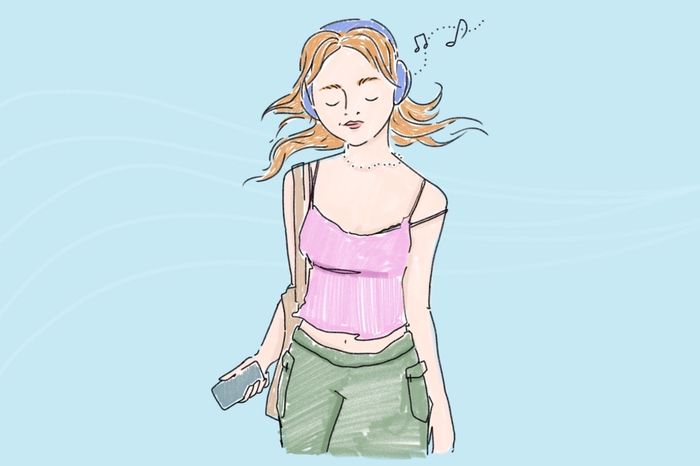Music in the bubble
Elspeth White explores how music can offer a bridge between home and Cambirdge

It’s not a hot take to say that student life in Cambridge is all-encompassing. In our microculture, where the language of “supos” and amusing abbreviations beginning with “CU” are the norm, it’s easy to lose touch with everything outside the “bubble”. I’ve watched myself embrace this bubble with open arms, running the span of this small city to jazz nights and ornate formals. But I’ve also never felt more connected to my roots: I drop my hometown (Nottingham!) into every conversation and unapologetically give anyone who visits my room a tour of my dad’s (borrowed) CD collection.
“I was finding home in my headphones and waiting for Cambridge to catch up”
Music is a cultural glue, each playlist a hybrid of what you carry from your past and what you want to take forward in the future. I started to wonder, as I passed headphoned people on their way to lectures or hauling bags back from Sainsburys, what they were listening to and what this meant for their identity. Several interviews in, I realised that the core of their Cambridge listening habits was this hybridity.
Everyone’s first term is like swimming in the deep end. In an attempt to romanticise the stress of what is possibly the most daunting transition of my life, I found myself clinging to the songs of my summer. Big Thief’s ‘Mythological Beauty’, Hozier’s ‘Unknown / Nth’ and Nick Drake’s ‘Pink Moon’ were the tracks I used to cope with the first few weeks. I was finding home in my headphones and waiting for Cambridge to catch up.
Of course, I wasn’t alone. Aniya, a first-year linguist, cites a joint playlist with her dad as her bridge between Cambridge and home. She listens to her dad’s recommendations and, like a conversation, replies with the songs she recognises him in. Her listening habits are also rooted in her heritage tongue, Bengali, something which she explores in an episode of her radio show ‘The Hazy Hour’.
“Music provides its own landscape: a town within a town and a place that changes as we change”
For others, music bridges a physical gap between university and home. Pat, in her first year studying geography, listens “to Thai songs just to feel like I’m home, even though, when I am back home, 80% of the time I listen to English songs”. Music provides its own landscape: a town within a town and a place that changes as we change.
At the end of Michaelmas comes the highly-awaited “Spotify Wrapped” that occupies the Internet’s headspace for a week. Scrolling through mine, I was shocked to find Ezra Collective (and Loyle Carner’s) ‘What Am I to Do?’ as one of my top songs of the year. Before coming to Cambridge, I wouldn’t have touched anything that even vaguely resembled jazz. Now, I actively seek jazz events out.
My love for this song wasn’t purely from a genre perspective: it reflected what, for me, felt like a Cambridge state of mind. Between mellow brass riffs, Carner says “lump on my neck, ain’t got time for a check-up”. During burnt-out walks to Sidgwick, this song encapsulated what it meant to always be in gear, unable to give myself the grace of a day off.
Music can be both a reflection of and rebellion against the elusive “Cambridge mindset”. It’s no surprise that essay writing prompts listening solely to sped-up music or one song on repeat to “maximise productivity”. Annabel, a first-year Natsci student, listens to hardcore techno as she races to finish an essay before midnight. Meanwhile, first-year art historian Rosa seeks music that complements Cambridge’s stone walls and wooden corridors, leaving The Smiths to her sixth-form self and instead embracing folk.
Annabel wasn’t alone in crediting her new musical influences to stress antidotes. Esther (first year, MML) incorporates jazz into her night-time ritual – when she’s not getting ready for a night out with 2010s pop bangers. She says she’s not a nostalgic person but enjoys carrying part of her year in Rome to Cambridge through the house music of Club Alcazar.
If there’s anything this research has taught me, it’s that there’s no binary divide between Cambridge and home, just as we might not be able to define where home is as university students. After all, how different is hearing a Jack Johnson song play at Harvey’s Coffee House (‘Upside Down’, for those of you familiar with Curious George) and studying to Charli XCX, slightly hungover, after the latest RAID queer night? I feel seen in both: my inner child of six and my proud bisexual self of eighteen. While it’s easy to resent the Cambridge bubble for its predictability, through my listening habits and the people and places that influence them, I can honestly say that I’ve found a home here, of some sort.
 Interviews / You don’t need to peak at Cambridge, says Robin Harding31 December 2025
Interviews / You don’t need to peak at Cambridge, says Robin Harding31 December 2025 Comment / What happened to men at Cambridge?31 December 2025
Comment / What happened to men at Cambridge?31 December 2025 News / Unions protest handling of redundancies at Epidemiology Unit30 December 2025
News / Unions protest handling of redundancies at Epidemiology Unit30 December 2025 News / Varsity’s biggest stories of 202531 December 2025
News / Varsity’s biggest stories of 202531 December 2025 News / Downing investigates ‘mysterious’ underground burial vault 29 December 2025
News / Downing investigates ‘mysterious’ underground burial vault 29 December 2025










